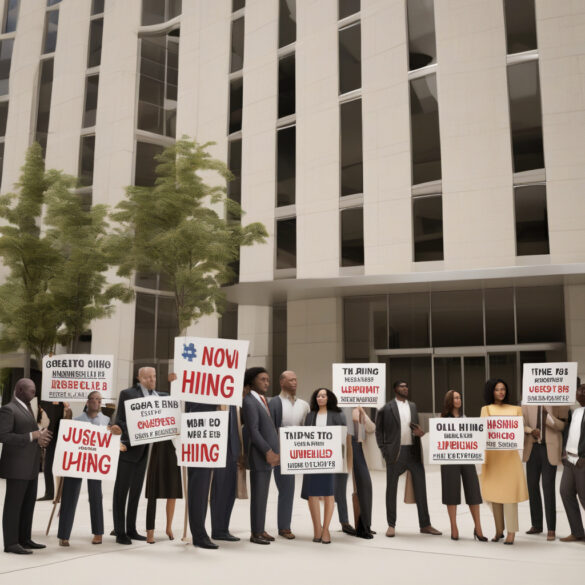Unemployment Ticks Up as Tariff-Related Uncertainty Slows Hiring
In recent months, the U.S. economy has seen a troubling development as unemployment rates have begun to rise, coinciding with an increase in tariff-related uncertainties that are causing companies to reconsider their hiring plans. This situation presents a significant challenge, not only for job seekers but also for the overall stability of the economy, as retail bankruptcies and store closures compound the issue.
The latest labor statistics indicate a slight uptick in unemployment rates, which many analysts attribute to the ongoing trade tensions and tariff disputes that have created a cloud of uncertainty over various sectors. Businesses are hesitant to expand their workforce when they are unsure about future costs, supply chain disruptions, and the potential impact of tariffs on their bottom lines. The hesitation to hire is most pronounced in the retail sector, which has seen significant changes in consumer behavior and market dynamics.
For instance, large retailers have reported dwindling foot traffic in stores, prompting some to cut back on hiring or even lay off employees. According to the National Retail Federation, U.S. retail sales growth has slowed down, raising concerns about the sector’s resilience in the face of economic pressures. Retailers are facing increased costs due to tariffs on imported goods, which can lead to higher prices for consumers and diminished sales volumes. This, in turn, leads to a more cautious approach to hiring.
Moreover, the retail landscape has been undergoing a transformation as e-commerce continues to gain ground. Traditional brick-and-mortar stores are closing at an alarming rate, with more than 10,000 retail stores having shut down in 2020 alone. This trend has only been exacerbated by the pandemic, which forced many consumers to shift to online shopping. As a result, companies are focusing more on their online operations and less on physical retail spaces. The combination of rising tariffs and changing consumer preferences has left many retailers in a precarious position.
In addition to retail, other sectors are also feeling the effects of tariff-related uncertainties. Manufacturers, for example, have reported disruptions in their supply chains, leading to increased production costs. When companies face higher costs, they often choose to delay hiring or even reduce their workforce to maintain profitability. The manufacturing sector is vital to the U.S. economy, and any slowdown here can have far-reaching consequences.
The situation is further complicated by the recent wave of retail bankruptcies. Companies like J.C. Penney, Neiman Marcus, and Hertz have filed for bankruptcy protection, citing a multitude of factors including mounting debt and the impacts of tariffs. These closures not only eliminate jobs but also reduce competition, which can lead to fewer options for consumers and potentially higher prices in the long run. As retailers struggle to keep their doors open, the ripple effects can be felt across the economy, leading to a decrease in consumer confidence and spending.
The uncertainty surrounding tariffs is also affecting small businesses. Many small retailers rely on imported goods to stock their shelves, and any increase in tariffs can directly impact their pricing structures. Small businesses often operate with tighter margins, making them more vulnerable to shifts in costs. Consequently, many small business owners are reluctant to hire new employees, fearing they may not be able to sustain additional payroll expenses amid rising costs.
To mitigate the impact of rising unemployment and a stagnant hiring environment, policymakers must consider implementing measures to alleviate the pressures caused by tariffs. Reducing or eliminating certain tariffs could provide immediate relief to businesses, enabling them to stabilize operations and resume hiring. Additionally, supporting sectors that have been particularly hard hit, such as retail and manufacturing, can help rejuvenate the job market.
In conclusion, the uptick in unemployment rates, coupled with tariff-related uncertainties, presents a significant challenge for the U.S. economy. As retailers face increased costs and shifting consumer behaviors, the need for proactive measures becomes increasingly urgent. By addressing the underlying issues associated with tariffs and supporting businesses in distress, policymakers can help foster a more stable economic environment that promotes job growth and decreases unemployment.
#Unemployment #Tariffs #Retail #Economy #Hiring
